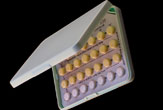Birth Control Effectiveness Linked to Weight

Several studies have called into question the effectiveness of birth control in obese and overweight women — results that are particularly concerning in light of the recent U.S. obesity epidemic.
Now, a recent review article, which examined the results of seven studies on the success of hormonal contraceptives, concludes that the situation might be more complex. Some birth control methods, such as the pill, might be less effective in obese women, while others, such as those given using a shot, might work just as well.
Adding to the confusion, scientists know little about how extra fat might lead to changes in metabolism and affect the way contraceptives are handled by the body. The researchers call for more studies of birth control in obese and overweight women so health care providers can best advise their patients.
Pregnancy risk
In total, the seven studies included 39,531 women. Four of the studies suggested that the heaviest women have the highest risk of pregnancy while using the contraceptives.
Yet a closer look at the studies, the researchers say, reveals a more complicated picture.
In one study of oral contraceptive pills, women with a body mass index (BMI) in the overweight range (a BMI of 25 or more) had a higher risk of pregnancy than those in the normal weight range. But two other studies looking at BMI and pregnancy risk found no such risk. In another study of contraceptive skin patches, higher body weight — not higher BMI — was associated with higher risks of pregnancy.
Get the world’s most fascinating discoveries delivered straight to your inbox.
BMI is thought to be an indicator of how much fat a person has, while body weight reflects the overall body size. So currently, the evidence that extra fat reduces the effectiveness of oral birth control is limited.
Other contraceptives such as injectable or implantable hormones might "be unaffected by body mass," said study author Laureen Lopez, of FHI, a global health and development organization. There was little difference in the rate of pregnancy between obese and non-obese women who used these methods, according to the studies.
Many researchers think that metabolic changes associated with obesity — in particular, the amount of body fat — could make hormonal birth control less effective. "However, we know little about how overweight women metabolize hormonal contraceptives," said Lopez, "since many studies exclude overweight women."
Other risks
Women who are obese or overweight also should consider potential health risks from hormonal contraceptives, said Dr. Amitasrigowri Murth, who directs the reproductive choice program at Bellevue Hospital Center in New York.
Some studies show that estrogen-based contraceptives can increase the risk of heart attack, blood clots, high blood pressure and gallbladder disease in obese women, "who are already at increased risk for these conditions," Murthy said.
Seeking alternatives, some women turn to progesterone-based contraceptives such as the injectable Depo-Provera, Murthy said, "but if you are already overweight or obese, you should know that there is a risk of weight gain in the first year of taking it [Depo-Provera]."
Another study earlier this year found that single obese women are less likely to use certain types of birth control and more likely to have unplanned pregnancies than normal weight women. While the exact causes behind the finding are not known, it could be that obese women are less likely to use oral contraception for fear of weight gain, or health care professionals are hesitant to prescribe them.
More research is needed so health care workers can better guide women as they choose a method of contraception, Lopez and colleagues said: "Given the prevalence of overweight and obesity, the public health impact of any effect on contraceptive efficacy could be substantial."
However, Lopez notes, "The contraceptive methods studied here are still among the most effective when used as recommended."
The review was published in the July issue of The Cochrane Library, a publication of The Cochrane Collaboration, an international organization that evaluates research in all aspects of health care.

